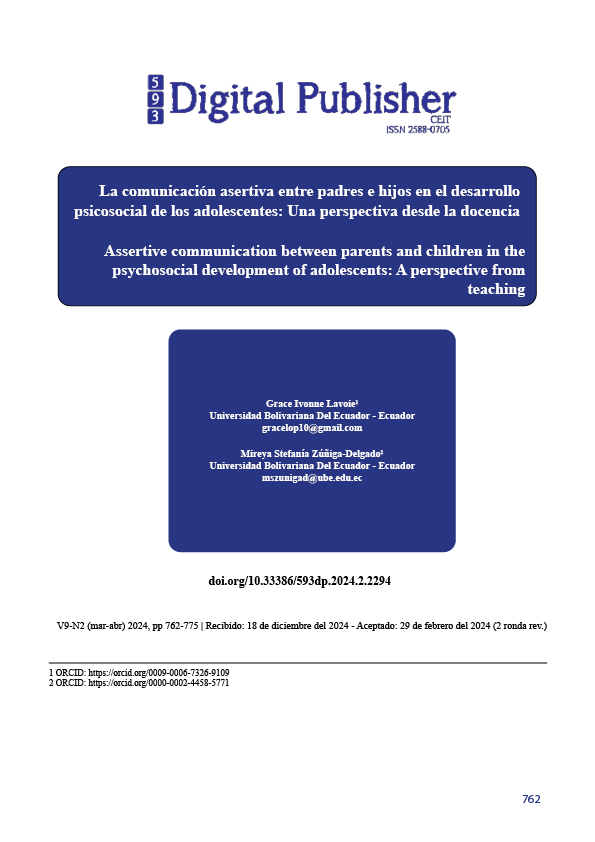Assertive communication between parents and children in the psychosocial development of adolescents: A perspective from teaching
Main Article Content
Abstract
The objective of the research was to determine the impact of assertive communication between parents and adolescents on psychosocial development from teaching, through mixed research to improve the family relationship of adolescents in their 1st year of high school at a Private Bilingual School. It was a descriptive and non-experimental research. The population and sample were divided by the techniques used, the first being interviews directed at the vice-rector and psychologist of the educational unit and surveys with a sample of 40 students and 20 parents. Among the results, the vice-rector has shown that communication between parents and adolescent children is deficient, either due to fights and arguments; There is little interest in participating in activities promoted by the educational unit. The psychologist stated that socio-emotional interviews are carry out. In a case of conflict found, they carry out a family approach. It was also found that parents and adolescents have different perceptions about family communication, where the former said excellent (35%) and good (65%), and for the latter it was average (20%) and bad (8%). Parents also believe 100% that workshops were held in the educational unit to promote assertive family communication, while the minors' opinions were divided (yes 40%, maybe 40% and no 20%). Improving family communication by making it assertive is very important for the relationship between parents and children, carrying out workshops that link them and that the educational unit is the conciliatory axis.
Downloads
Article Details

This work is licensed under a Creative Commons Attribution-NonCommercial-ShareAlike 4.0 International License.
1. Derechos de autor
Las obras que se publican en 593 Digital Publisher CEIT están sujetas a los siguientes términos:
1.1. 593 Digital Publisher CEIT, conserva los derechos patrimoniales (copyright) de las obras publicadas, favorece y permite la reutilización de las mismas bajo la licencia Licencia Creative Commons 4.0 de Reconocimiento-NoComercial-CompartirIgual 4.0, por lo cual se pueden copiar, usar, difundir, transmitir y exponer públicamente, siempre que:
1.1.a. Se cite la autoría y fuente original de su publicación (revista, editorial, URL).
1.1.b. No se usen para fines comerciales u onerosos.
1.1.c. Se mencione la existencia y especificaciones de esta licencia de uso.
References
Azuero, Á. (2018). Significatividad del marco metodológico en el desarrollo de proyectos de investigación . Revista Arbitrada Interdisciplinaria KOINONIA, 4(8), 110-127. https://doi.org/https://dialnet.unirioja.es/descarga/articulo/7062667.pdf
Barrios, M., & Frías, M. (2016). Factores que Influyen en el Desarrollo y Rendimiento Escolar de los Jóvenes de Bachillerato. Revista de Psicologia, 3. Red de Revistas Científicas: https://www.redalyc.org/jatsRepo/804/80444652005/html/index.html
Bernal, Á., Cañarte, C., Macias, T., & Ponce, M. (2022). La comunicación asertiva y su aporte en el proceso de enseñanza y aprendizaje. Polo del Conocimiento, 7(4), 682-695. https://doi.org/10.23857/pc.v7i4.3850
Cevallos, K., Martínez, C., Peñaherrera, A., & Punin, A. (2020). Impacto psicológico de la pandemia en niños y adolescentes. COVID19EC, 1(1), 1-11. https://doi.org/https://uanalisis.uide.edu.ec/impacto-psicologico-de-la-pandemia-en-ninos-y-adolescentes/
CPEIP. (1 de Agosto de 2020). Planificando una estrategia para la contención socioemocional de la comunidad educativa. Centro de Perfeccionamiento, Experimentación e Investigaciones Pedagógicas: https://www.cpeip.cl/wp-content/uploads/2020/09/planificando-estrategia-contencion-comunidad-educativa-FINAL-1.pdf
Dorantes, C. (2018). El Proyecto de Investigación en Psicología: De su Génesis a la Publicación. 2a ed. Ciudad de México: Universidad Iberoamericana.
Galiano, M. P., & Mustelier, R. (2020). Salud mental en la infancia y adolescencia durante la pandemia de COVID-19. Revista Cubana de Pediatría, 92(1), 1-19. http://scielo.sld.cu/pdf/ped/v92s1/1561-3119-ped-92-s1-e1342.pdf
Hernández, R., Fernández, C., & Baptista, M. (2014). Metodología de la Investigación. 6ta edición. México D.F.: McGrall Hill.
Maldonado, J. (2018). Metodología de la investigación social: Paradigmas: cuantitativo, sociocrítico, cualitativo, complementario. Bogotá: Ediciones de la U.
Ministerio de Educación. (6 de Septiembre de 2013). Instructivo para la construcción participativa del código de convivencia en base a la guía metodológica. Acuerdo Ministerial 332-13. Subsecretario de Apoyo, Seguimiento y Regulación de la Educación: https://www.educarecuador.gob.ec/anexos/ayuda/instructivo_del_codigo_de_convivencia.pdf
Presley, T. (2022). Comunicación Asertiva. Desarrolle sus Habilidades de Comunicación Asertiva y Aprenda Instantáneamente Cómo Defenderse, Comunicarse Efectivamente y Aumentar Mientras Gana el Respeto de los demás. Presley.
Ramos, J. (2020). Manual práctico de comunicación asertiva. XinXii.
Rosendo, V. (2018). Investigación de mercados: Aplicación al marketing estratégico empresarial. Madrid: ESIC Editorial.
Sánchez, I. (2021). Impacto psicológico de la COVID-19 en niños y adolescentes. MEDISAN, 25(1), 123-141. http://scielo.sld.cu/scielo.php?script=sci_arttext&pid=S1029-30192021000100123&lng=es&tlng=es
Simonds, L. (2024). Comunicación Asertiva: Las Reglas Principales para Mejorar la Comunicación, Aprender a Decir No y Obtener el Respeto que Mereces en las Relaciones Personales y Profesionales. Leon Simonds.
Soledispa, A., San Andrés, E., & Soledispa, R. (3 de Diciembre de 2020). Revista Sinapsis. Revista Sinapsis: https://revistas.itsup.edu.ec/index.php/sinapsis/article/view/431
UNICEF. (19 de Octubre de 2020). El impacto del COVID-19 en la salud mental de adolescentes y jóvenes. Fondo de las Naciones Unidas para la Infancia: https://www.unicef.org/lac/el-impacto-del-covid-19-en-la-salud-mental-de-adolescentes-y-j%C3%B3venes#:~:text=UNICEF%202020%20Entre%20las%20y,en%20los%20%C3%BAltimos%20siete%20d%C3%ADas.
Villarroel, V., & Bruna, D. (5 de Junio de 2017). Scielo. Scielo: https://scielo.conicyt.cl/scielo.php?script=sci_arttext&pid=S0718-50062017000400008
Villasmil, J., & Josía, I. (2007). Plan de acción para el mejoramiento de la calidad de los talleres ofrecidos en la Casa Don Bosco de Valencia: una propuesta. Laurus, 13(25), 263-285. https://doi.org/https://www.redalyc.org/pdf/761/76111479013.pdf



